This spring, the Michigan athletic department admitted what many had long suspected: Student football ticket sales are down, way down, from about 21,000 in 2012 to a projected 13,000-14,000 this season.
The department has blamed cell phones, high-definition TV and student apathy sweeping the nation. All real problems, to be sure, but they don't explain how Michigan alienated 40 percent of its students in just two years -- and their parents, too.
How did Michigan do it? By forgetting why we love college football.
Dave Brandon, the former Domino's Pizza CEO-turned-Michigan athletic director, has often cited the difficulty of using cell phones at Michigan Stadium as "the biggest challenge we have." But when Michigan students were asked in a recent survey to rank seven factors that would influence their decision to buy season tickets, cell-phone coverage was seventh -- dead last.
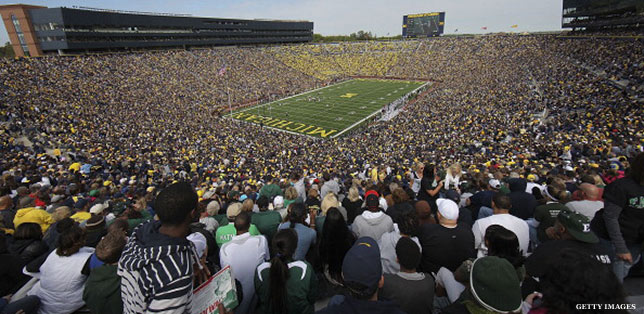
What did they rank first? Being able to sit with their friends.
But Brandon did away with that last year, with a new student seating seating policy. Instead of seating the students by class -- with the freshmen in the end zone and the seniors toward the 50, as Michigan had done for decades -- last year it was first come, first served. If you wanted to sit together, you had to walk in together. (They also raised the price from $195 for six games in 2013 to $295 for seven games.)
The idea was to encourage students to come early, and come often. Thousands of students responded by not coming at all.
This was utterly predictable -- and I predicted it, 13 months ago, in this column. Since the mid-70s, TV networks have loved showing blimp shots of the sold-out Big House -- one of college football's iconic sights. Now, with the student section still half empty at kickoff, they don't show any.
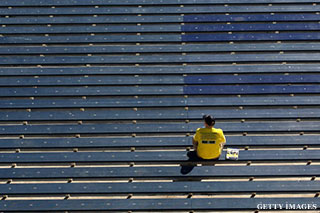 Working with student government leaders, the athletic department revised the policy for the 2014 season, giving the best 6,000 seats to the best "frequent fliers" from 2013, and allotting the rest by class. But it was apparently too little, too late, as some 6,000 Michigan students decided to drop their tickets for 2014 anyway.
Working with student government leaders, the athletic department revised the policy for the 2014 season, giving the best 6,000 seats to the best "frequent fliers" from 2013, and allotting the rest by class. But it was apparently too little, too late, as some 6,000 Michigan students decided to drop their tickets for 2014 anyway.
Insult to injury: Most college teams now play their biggest rivals on Thanksgiving weekend, when many students have gone home.
If the students don't love college football now, when it's half-price, will they love it more when they're paying twice that?
"We know who our competitor is," Brandon often says. "Your 60-inch, high-definition TV."
If that's true, maybe they shouldn't have increased seat prices by an average of $100 each since Brandon took over in 2010. Perhaps they should stop charging six bucks for a hot dog, five bucks for popcorn and four dollars for water. Maybe they shouldn't make their paying customers wait 20 minutes to get to their seats, another 20 to buy that six-dollar hot dog, and 20 more to visit a bathroom – marking an hour waiting in line for things fans at home can get in a minute.
Of course, every college football season-ticket holder's most hated delay is TV timeouts. Because just about every major college game is televised, ticket holders have to endure about twenty commercial breaks per game, plus halftime. That adds up to more than 30 minutes of TV timeouts -- about three times more than the 11 minutes the ball is actually in play.
To loyal fans, who sit in stadiums that are often too hot in September and too cold in November and too rainy in between, this is as galling as taking the time, money, and effort to drive downtown to a local store, only to have to wait while the clerk talks on the phone with someone who didn't bother to do any of those things.
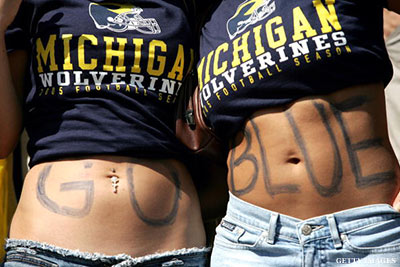 I'm amazed how eagerly universities have sold their souls to TV. It wasn't always this way. Michigan's legendary coach, Bo Schembechler, often said, "Toe meets leather at 1:05. If you want to televise it, fine. If you don't, that's fine too."
I'm amazed how eagerly universities have sold their souls to TV. It wasn't always this way. Michigan's legendary coach, Bo Schembechler, often said, "Toe meets leather at 1:05. If you want to televise it, fine. If you don't, that's fine too."
Bo's boss, Don Canham, backed him. For years, TV was dying for a night game at the Big House. Canham wasn't. So, they compromised -- and didn't have one.
If season-ticket holders want night games, give 'em what they want. But nobody likes waiting for TV to decide when your favorite team is going to play that week -- especially fans flying in from far away.
Why do the people who run college football let TV spoil your day at the stadium? TV doesn't make spectators at the Indy 500, the Masters or the World Cup wait for their ads -- yet those events still make billions. If the TV whizzes can't figure out how to make a buck on football without ruining the experience for paying customers, those fans will figure it out for themselves, and stay home.
While TV is running ads for fans at home, college football stadiums too often give their loyal season-ticket holders not the marching band or -- heaven forbid -- time to talk to their family and friends, but rock music and, yes, ads! To its credit, Michigan doesn't show paid advertisements, but the ads it does show -- to get fans to host their weddings at the 50-yard line, starting at $6,000, and their corporate receptions in the skyboxes, starting at $9,000 -- Michigan fans find just as annoying.
 Yes, advertising in the Big House does matter. Americans are bombarded by ads, about 5,000 a day. Michigan Stadium used to be a sanctuary from modern marketing, an urban version of a National Park. Now it's just another stop on the sales train.
Yes, advertising in the Big House does matter. Americans are bombarded by ads, about 5,000 a day. Michigan Stadium used to be a sanctuary from modern marketing, an urban version of a National Park. Now it's just another stop on the sales train.
Everything the ticket holders spend hundreds of dollars to wait for and pay for, they can get at home for next to nothing – including the ads -- plus better replays. They can only get the marching band at the Big House.
Survey after survey points the finger for lower attendance not at cell phone service or HDTV, but squarely at the decisions of athletic departments nationwide. Fans are fed up paying steakhouse prices for junk food opponents, while enduring endless promotions. The more college football indulges the TV audience, the more fans paying to sit in those seats feel like suckers.
Yes, Michigan's athletic department has always followed basic business practices, but it has never been run strictly as a business -- until now. The proof is the wait list, which former athletic director Don Canham grew by the thousands. Canham was a multi-millionaire businessman in his own right. If he wanted to "maximize revenue," he knew he could increase the price to meet demand, just like hotels do. But he didn't, because he believed that would dispel the magic of Michigan Stadium.
Brandon's predecessor, Bill Martin, introduced Personal Seat Licenses to the Big House, but only after the nation's next 19-biggest stadiums had already done so. Even then, the PSL program was relatively moderate, he spared the fans in the endzones, and he lowered ticket prices after the 2008 recession. Even after the team finished 3-9 in 2008 and 5-7 in 2009, Michigan's wait list remained robust.
"Just because you can charge them more," Martin told me, "doesn't mean you should. You're not there to ring up the cash to the nth degree. It's a nonprofit model!"  In Brandon's first four years, he has increased the operating budget from $107 million to $147 million. That does not include the building program, most recently estimated at $340 million. In Brandon's defense, he has generated a $5 million surplus (down from $9 million a year ago) and the buildings will benefit all Michigan's teams, not just football and basketball. But his budget also includes his $1 million salary, almost three times what Bill Martin paid himself -- and yes, the AD does pay himself -- plus Brandon's $300,000 annual bonus, which contributes to a 72-percent increase in administrator compensation; not to mention an 80-percent increase in "marketing, promotions and ticketing"; and a 340-percent increase in "Hosting, Food and Special Events."
In Brandon's first four years, he has increased the operating budget from $107 million to $147 million. That does not include the building program, most recently estimated at $340 million. In Brandon's defense, he has generated a $5 million surplus (down from $9 million a year ago) and the buildings will benefit all Michigan's teams, not just football and basketball. But his budget also includes his $1 million salary, almost three times what Bill Martin paid himself -- and yes, the AD does pay himself -- plus Brandon's $300,000 annual bonus, which contributes to a 72-percent increase in administrator compensation; not to mention an 80-percent increase in "marketing, promotions and ticketing"; and a 340-percent increase in "Hosting, Food and Special Events."
OK, you start dictating terms to TV networks, they might cut back on the cash -- though I doubt it. But even if they did, what would that mean? Perhaps Michigan's rowing team would have to make do with a $20 million training facility, instead of a $25 million one. Maybe Michigan head coach Brady Hoke would have to get by on $2 million a year, instead of $4 million. Perhaps Brandon might just have to feed his family on $300,000 a year, instead of $1.15 million.
I think Michigan could somehow survive these deprivations. It would be worth it if, in the bargain, the university get its soul back.
I've come to believe it's not scandal that will bring down college athletics, but greed. How long can these numbers, fueled by increasingly unhappy fans, continue to skyrocket before they come crashing down to earth?
All that money comes from someone -- and that someone is you, the fans. Tickets used to be underpriced, and you knew that when you scalped them for more than you paid. Now they're overpriced, and you know that when you try to sell them through Michigan's Official Scalper, StubHub, and get far less. 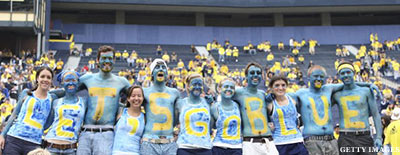 The wait list is long gone. The department has been sending wave after wave of emails to former ticket holders, retired faculty members and even rival fans to assure them, "The deadline has been extended!" Beg your former customers to come back five times, and you don't have a deadline, and you don't have a wait list.
The wait list is long gone. The department has been sending wave after wave of emails to former ticket holders, retired faculty members and even rival fans to assure them, "The deadline has been extended!" Beg your former customers to come back five times, and you don't have a deadline, and you don't have a wait list.
This fall Michigan is in danger of breaking its string of 251 consecutive games with 100,000-plus paid attendance, which started in 1975. The college football world should take note. Michigan boasts the most living alumni in the world, roughly 500,000, and the second biggest fan base, of 2.9 million, behind only Ohio State's.
Michigan fans are not the canaries in the coal mine. They are the coalminers. The people who run college football should take note.
Michigan's biggest problem is not knowing who its customers are, what they're like and what they want.
Brandon often says, "We all think of every home Michigan football game like a miniature Super Bowl."
I don't know any Michigan fans who think that. Quite the opposite, they think Michigan football games are the antidote for the artificial excess of the Super Bowl -- as do most college football fans.
In 2005, then-athletic director Bill Martin commissioned a survey that revealed more than 50 percent of Michigan season-ticket holders had been buying them for more than two decades, but only 9 percent of them also bought season tickets to any professional team. This tells us a basic truth:
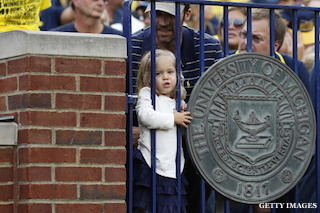 Michigan football fans don't just love football. They love Michigan football -- the history, the traditions, the rituals -- the timeless elements that have grown organically over decades. They are attracted to the belief that Michigan football is based on ideals that go beyond the field, do not fade with time, and are passed down to the next generation -- the very qualities that separate a game at the Big House from the Super Bowl.
Michigan football fans don't just love football. They love Michigan football -- the history, the traditions, the rituals -- the timeless elements that have grown organically over decades. They are attracted to the belief that Michigan football is based on ideals that go beyond the field, do not fade with time, and are passed down to the next generation -- the very qualities that separate a game at the Big House from the Super Bowl.
After the 2013 Notre Dame game, Brandon said, "You're a 17-18 year old kid watching the largest crowd in the history of college football with airplanes flying over and Beyonce introducing your halftime show? That's a pretty powerful message about what Michigan is all about, and that's our job to send that message."
Is that really what Michigan is all about? Fly-overs, blaring rock music and Beyonce? Beyonce is to Michigan football what Bo Schembechler is to -- well, Beyonce. No, Michigan is all about lifelong fans who've been coming together for decades to leave a bit of the modern world behind -- and the incessant marketing that comes with it -- and share an authentic experience fueled by the passion of the team, the band and the students. That's it.
In his speeches, Brandon often mentions he's served as the CEO for three Fortune 500 companies -- the apotheosis of a recent trend among major programs such as Oregon, Notre Dame and Penn State, who've passed over experienced athletic directors to hire outside business gurus.
But if Brandon knows so much about business, why does he know so little about the people who've been filling the Big House for decades?
When the late Michigan broadcaster Bob Ufer said, "Michigan football is a religion, and Saturday is the holy day of obligation," he was on to something.
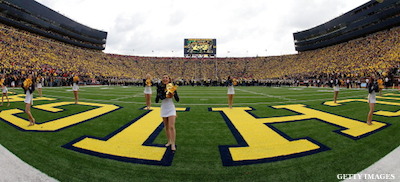 If the people running college football see their universities as just a brand, and the athletic departments merely a business, they will turn off the very people who've been coming to their temples for decades. Athletic directors need to remember the people in the stands are not customers. They're believers. Break faith with your flock, and you will not get them back with fancier wine.
If the people running college football see their universities as just a brand, and the athletic departments merely a business, they will turn off the very people who've been coming to their temples for decades. Athletic directors need to remember the people in the stands are not customers. They're believers. Break faith with your flock, and you will not get them back with fancier wine.
If you treat your fans like customers long enough, eventually they'll start behaving that way, reducing their irrational love for their team to a cool-headed, dollars-and-cents decision to buy tickets or not, with no more emotional investment than deciding whether to go to the movies or buy new tires.
After a friend of mine took his kids to a game, he told me, "Michigan athletics used to feel like something we shared. Now it's something they hoard. Anything of value they put a price tag on. Anything that appeals to anyone is kept locked away -- literally, in some cases -- and only brought out if you pay for it. And what's been permanently banished is any sense of generosity."
After Brandon became Michigan's 11th athletic director in 2010, he often repeated one of his favorite lines: "If it ain't broke ... break it!"
You have to give him credit: He has delivered on his promise.
-- John U. Bacon is the author, most recently, of Fourth and Long: The Fight for the Soul of College Football, a New York Times bestseller. He gives weekly commentary on Michigan Radio, teaches at the University of Michigan and Northwestern's Medill School of Journalism, and speaks nationwide on leadership and diversity. Learn more at JohnUBacon.com, and follow him on Twitter @johnubacon.




